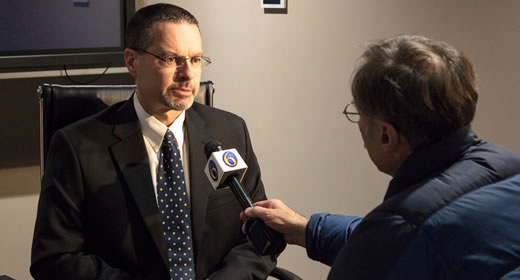
While local leaders say police forces across Michigan have good overall relations with their communities, those in larger cities worry about the possibility of civil unrest after well-publicized incidents in Ferguson, Missouri, and Baltimore.
In Michigan cities with more than 30,000 residents, 64 percent of local leaders are somewhat or very concerned about potential civil unrest and only 10 percent are "not at all concerned," according to a University of Michigan survey of the state's local government leaders.
Statewide, 57 percent of local leaders are "not at all concerned" that a major incident of civil unrest connected to police use-of-force could happen in their jurisdiction in the near future, while 32 percent are not very concerned. Those in 8 percent of jurisdictions are somewhat concerned that an incident could occur, and just 2 percent are very concerned.
Police-community relations have been on the minds of many government leaders, law enforcement officers, policy analysts, citizens, community activists and others since August 2014 when a white police officer in Ferguson shot and killed unarmed black teenager Michael Brown and civil unrest ensued. In April 2015, the death of Freddie Gray while in police custody in Baltimore further inflamed tense relations in communities across the nation.
"Recent news reports have highlighted concerning incidents in cities across the country, including here in Michigan," said Tom Ivacko, administrator of the Gerald R. Ford School of Public Policy's Center for Local, State and Urban Policy.
"Ferguson and Baltimore now serve as shorthand for what many see as inappropriate police use-of-force, racial targeting and use of military-style equipment and tactics."
Other key findings from the Michigan Public Policy Survey include:
• The heightened concern in large cities is related to population density, increased racial diversity and self-reported recent incidents of inappropriate use-of-force by law enforcement (reported in 12 percent of Michigan's large cities compared to 4 percent of all jurisdictions statewide).
• Large cities are more likely than other jurisdictions to have policies and practices in place to minimize police-community tensions such as citizen task forces and mandating independent investigations into officer-involved shootings.
• Dashboard and body cameras are also more prevalent in large cities.
• Forty-eight percent of local officials support their local law enforcement agency acquiring military equipment, while 20 percent oppose this.
"Looking beyond cities, Michigan's local leaders have relatively balanced attitudes on the question of ensuring privacy versus security through the use of surveillance technology," Ivacko said. "They are more likely to support than oppose the presence of military equipment within local law enforcement, a potential trigger of increased tension with residents."
--Release by Greta Guest, Michigan News Service
The Michigan Public Policy Survey was sent from Oct. 5-Dec. 8, 2015, via hard copy and the Internet to elected and appointed officials in Michigan. A total of 1,418 jurisdictions returned valid surveys, a 76 percent response rate. The margin of error was 1.3 percent.
